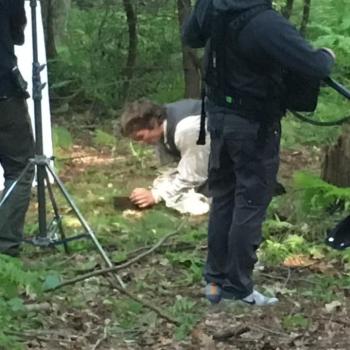 By Josef Sorett
By Josef Sorett
Although we are only about halfway into 2010, it has already been a year full of rich public conversations about religion in America. Much of the credit can be given to the emergence of several new blogs and web portals that direct concentrated attention to the topic. Indeed, there is much material to mine as we think about "The Future of Religion," in general, and of The Black Church, in particular.
With regard to the latter, to restate a common theme this year, it must be acknowledged that such a conversation can move once and for all from the singular to the plural. There has always been a range of black churches, in terms of theology, polity, politics, aesthetics, etc. So it is also impossible to speak of any one future for the array of institutions lumped together under the rubric, "The Black Church." That said, there are several things that should be considered in efforts to forecast the futures of black churches.
To begin, it would be helpful to stop talking about black churches as if it they do not breathe the same air as American churches, more broadly, and are not influenced by the same globalizing forces that export Christianity to (and re-import it from) countries in the so-called developing world, i.e., the global South. To recognize this is not to deny the history of colonialism and enslavement that produced segregated congregations and forever marks black and white churches as worlds apart in terms of access to power and privilege. For instance, it would be foolish to forget that even the modern Pentecostal movement, which emphasized the spirit's ability to transcend race at its inception, quickly gave way to forces that produced today's racially divided Pentecostal and holiness denominations. At least in this regard, they've followed the lead of their mainline counterparts.
To accent this shared cultural fiber does not diminish the fact that the very survival of black people -- and the panoply of social problems that white supremacy has occasioned -- has always been central to the mission of black churches. In light of this racial (and racist) history, it is important to think about the tradition of black churches serving as a counter (sometimes oppositional) public sphere that nurtured alternative religious and racial discourses. However, we must also ask how this sphere has changed in an age of legal (if not actual) equality and mainstream visibility. No, the prevalence of post-race talk is not evidence that racism is no more. But it does signal a change that black institutions, including churches, must address. We might think about this on two grounds: 1) the cultural and 2) the political.
In terms of the cultural: One irony of the post-Civil Rights era is that the destinies of American churches (regardless of race and ethnicity) are increasingly intertwined and defined by a shared set of social, cultural, and technological developments, even as they remain racially segregated. Across this common terrain, at least two connected trends need to be tracked.
First, there is the continuing decline of mainline Christianity, which is coupled with the rapid rise of Pentecostal-Charismatic churches. This reality crosses Protestant and Catholic lines. And it is not just about denominational migration. In fact, many churches are thriving, numerically, within the mainline. However, they are typically ones that embrace neo-Pentecostal and Charismatic forms of liturgy (less is more), music (less hymnal is more), and hierarchy (less democratic is more).
A second item to note is the increasing influence of new media technologies, in general, and religious broadcasting, specifically. And it is not incidental that churches that are most adept with new media also tend to fall within Charismatic renewal circles, within and without denominations.
With regard to the political: We might start by considering the salience of "The Black Church" language in a moment in which folks (at least, scholars) are arguing that there is no such thing. Rather than end the conversation, attention ought to be given to the work that the phrase has and continues to perform -- we'll call it The Trope of The Black Church. This requires recognizing that appeals to "The Black Church" were part of a broader uplift discourse that emphasized racial solidarity and was tied to traditional models of civil rights politics.
It was (and is) a rhetoric deployed, largely, by the religious equivalent of W.E.B. Du Bois' "talented tenth" (read: black elites). It downplays difference for the purpose of specific political gains. But it also excludes many blacks along the lines of class, gender, and sexual orientation. Ultimately, it assumes a male, middle-class, heterosexual privilege that may no longer be sustainable, even as performances of hyper-masculinity remain appealing to many. So, as one thought, we might explore how this history of racial ideologies intersects with the historically evangelical character of black churches, as well as the more the recent role of evangelicalism in American politics, right and left.




